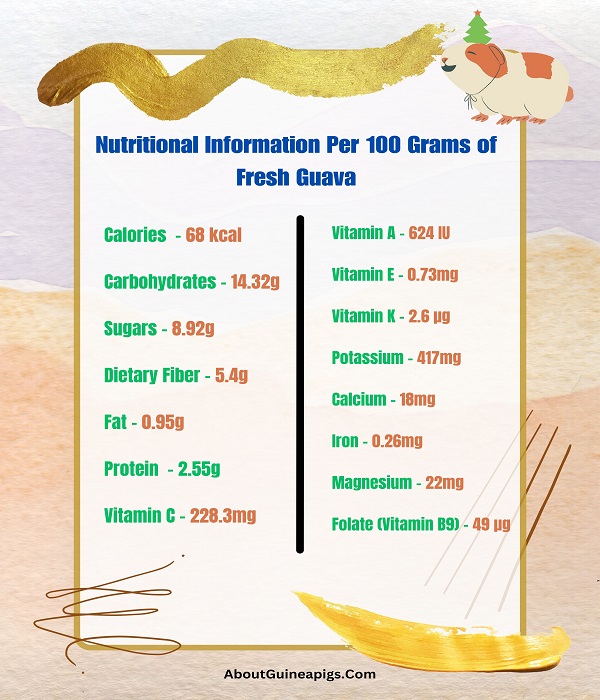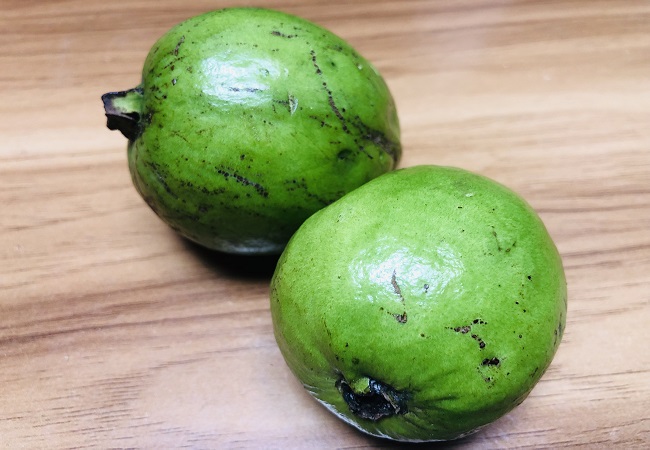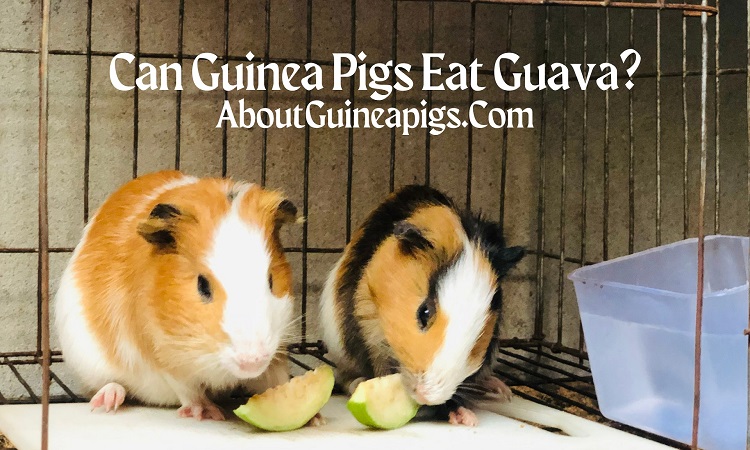As a devoted and caring guinea pig owner, it is only natural to seek out the best possible diet for these delightful and gentle companions. Today I am going to share the result and discussion of my another experiment that I have conducted with my guinea pigs Max & Maya.
The experiment topic is can guinea pigs eat guava? I want to know the real result of doing an experiment.
Guinea pigs, with their unique dietary needs, rely heavily on their owners to provide them with a balanced and nutritious menu. In this quest for optimal nutrition, various fruits often become subjects of curiosity, including the tropical delicacy, of guava.
Guava is renowned for its rich vitamin content and delectable taste, prompting guinea pig owners to wonder whether this exotic fruit can be safely included in their pets’ diets. That’s why I decide to do a real life experiment with my loving guinea pigs.
In this exploration, I will delve into the question of do guinea pigs eat guava? By examining the nutritional value of guava, potential risks, and benefits, we aim to shed light on whether this tropical fruit is a suitable addition to the guinea pig’s menu.
Contents
Can Guinea Pigs Eat Guava? An Experimental Investigation
Guinea pigs are delightful and adorable pets, and their health is of paramount importance to their owners. As a conscientious pet owner, conducting real-life experiments to determine suitable dietary options is a responsible approach.
One such experiment involved introducing guava to guinea pigs Max and Maya to ascertain its suitability as part of their diet. This essay delves into the experiment, its results, the potential risks and benefits, and a discussion about the implications for guinea pig care.
Experiment:
The goal of the experiment was to observe the response of guinea pigs Max and Maya when offered guava. Approximately 3 grams of fresh guava were provided to each guinea pig, and their interactions with the fruit were closely monitored. The guinea pigs’ behavior and consumption of guava were observed over a specific time frame.
Objective and Participants: The aim of this experiment was to determine whether guinea pigs can safely consume guava and if the fruit offers any nutritional benefits for these small rodents. Two guinea pigs named Max and Maya.
Method: Approximately 3 grams of fresh guava were offered to each guinea pig. The guinea pigs’ responses to the fruit, including their willingness to eat it, were closely observed for a specific period.
Results:
Contrary to expectations, both guinea pigs displayed disinterest in guava when offered the fruit. Upon smelling it, they appeared hesitant and began to observe it cautiously.
Subsequently, both Max and Maya distanced themselves from the guava, indicating their unwillingness to consume it. Ultimately, neither guinea pig ate any guava, resulting in a consumption rate of 0%.
Here is the video. This video will help you to understand the behavior of my guinea pig while I offered guava to them.
Guava Consumed Report:
|
Descriptions |
Amounts To Eat (Max & Maya) |
|
Was Given To Eat |
3 Grams |
|
They Ate |
0 Grams |
|
Percent Ate (%) |
0% |
|
Remains |
3 Gram |
Discussion:
The experiment’s results suggest that guinea pigs Max and Maya are not attracted to guava as part of their diet. As responsible pet owners, it is crucial to respect their preferences while ensuring they receive the necessary nutrients from other suitable sources.
The result is, they don’t eat guava, maybe they don’t like to eat guava or may have any other problems. But It doesn’t mean that all guinea pigs may not like to eat guava. Every guinea pig may have their own choice of food.
Based on the observed behavior of Max and Maya, it can be inferred that guava is not a preferred food for guinea pigs. While guava contains essential nutrients such as vitamin C and fiber, these guinea pigs did not show a natural inclination to eat it.
Some alternative fruits that guinea pigs often enjoy include apples, strawberries, and watermelon. However, it is essential to introduce new foods gradually and in small quantities to monitor their reactions and prevent potential health issues.
As with any dietary experimentation, individual guinea pigs may have different preferences, and it is crucial to ensure their nutritional needs are met through other suitable foods.
You can also Read my other experiments
Nutrition in Guava
Guava is a tropical fruit known for its unique flavor, aroma, and nutritional richness. It is a popular choice for health-conscious individuals due to its impressive array of essential vitamins, minerals, and dietary fiber.

Below are the key nutritional components found in guava:
Vitamin C: Guava is one of the richest sources of vitamin C, containing approximately four times the amount found in an orange. Vitamin C is a powerful antioxidant that helps boost the immune system, supports collagen formation, and aids in the absorption of iron.
Dietary Fiber: Guava is high in dietary fiber, both soluble and insoluble. The presence of fiber helps promote healthy digestion, prevents constipation, and contributes to a feeling of fullness, which can assist in weight management.
Vitamin A: Guava contains beta-carotene, a precursor to vitamin A, which is essential for maintaining healthy vision, skin, and the immune system.
Vitamin E: Another antioxidant present in guava is vitamin E, which helps protect the body’s cells from damage caused by free radicals, supporting overall cellular health.
Potassium: Guava is a good source of potassium, an essential mineral that plays a vital role in regulating blood pressure, maintaining proper heart function, and supporting muscle contractions.
Folate: Guava contains folate, also known as vitamin B9, which is important for cell division and DNA synthesis. It is particularly crucial for pregnant women, as it supports proper fetal development.
Magnesium: This mineral is involved in various physiological processes, including muscle and nerve function, energy production, and bone health. Guava provides a moderate amount of magnesium.
Calcium: Guava offers a small amount of calcium, contributing to bone health and proper nerve function.
Iron: While guava contains iron, it is in a non-heme form, which is not as readily absorbed by the body as heme iron found in animal products. Nonetheless, consuming guava alongside vitamin C-rich foods can enhance iron absorption.
Vitamin K: Guava contains vitamin K, which plays a crucial role in blood clotting and bone health.
Guava’s nutritional profile makes it a valuable addition to a balanced diet. However, when considering offering guava or any other new food to guinea pigs or other pets, it is essential to be cautious and consult with a veterinarian to ensure it is safe and suitable for their specific needs.
Benefits and Risks of Feeding Guava to Guinea Pigs
Guava have some benefits but also have some risk for feeding guinea pigs. Below I have discussed both benefits and risks of guava for guinea pigs.

Benefits of Feeding Guava to Guinea Pigs:
Vitamin C: Guava is an excellent source of vitamin C, a vital nutrient that guinea pigs cannot synthesize on their own. Including guava in their diet helps prevent scurvy, a condition caused by vitamin C deficiency, and supports overall immune health.
Dietary Fiber: The high dietary fiber content in guava aids in maintaining healthy digestion for guinea pigs. It promotes regular bowel movements, prevents constipation, and supports gut health.
Antioxidants: Guava contains various antioxidants, such as vitamin C and vitamin E, which help neutralize harmful free radicals in the body, contributing to better overall health.
Hydration: Guava has a high water content, which can help keep guinea pigs hydrated when consumed as a juicy fruit option.
Risks and Considerations:
Digestive Sensitivity: Some guinea pigs may have sensitive stomachs, and introducing guava or any new food suddenly can lead to digestive issues like diarrhea or upset stomach. It is essential to introduce new foods gradually and observe their reactions.
High Sugar Content: While guava is a nutritious fruit, it contains a relatively high amount of natural sugars. Excessive sugar consumption can lead to weight gain and other health problems. Moderation is key when offering guava to guinea pigs.
Calcium-to-Phosphorus Ratio: The calcium-to-phosphorus ratio in guava may not be optimal for guinea pigs. High calcium content and imbalanced calcium-to-phosphorus ratios can lead to urinary problems and kidney issues. A varied diet with other calcium sources should be provided.
Allergic Reactions: Some guinea pigs may be allergic to certain fruits, including guava. Signs of allergies may include itching, rashes, or respiratory issues. If any allergic reactions are observed, guava should be removed from their diet immediately.
Pesticides and Chemicals: Ensure that the guava is thoroughly washed and free from pesticides or harmful chemicals before offering it to guinea pigs.
Obesity: Due to its sweet and appealing taste, guinea pigs may overindulge in guava if given unlimited access. Overeating sugary fruits can contribute to obesity and other health problems, so portion control is essential.
Note: Guava can be a nutritious addition to a guinea pig’s diet due to its high vitamin C and fiber content. However, it should be offered in moderation and only after careful consideration of the individual guinea pig’s health and dietary requirements.
Frequently Asked Questions
Q: Is guava okay to guinea pigs?
A: Yes, guava is generally okay for guinea pigs in moderation. It provides essential nutrients like vitamin C and fiber but should be given as an occasional treat alongside a balanced diet. Monitor your guinea pig’s reaction and consult a veterinarian if any issues arise.
Q: Can guinea pigs eat guava skin?
A: No, it’s best not to feed guinea pigs guava skin. The skin can be tough and difficult for them to digest. Remove the skin and offer the fleshy part of the guava as a treat in small, bite-sized pieces.
Q: What fruit do guinea pigs love the most?
A: Guinea pigs tend to love sweet and juicy fruits. Some of the fruits they often enjoy the most include apples, strawberries, and watermelon. However, it’s important to offer fruits in moderation due to their high sugar content.
Q: Can guinea pigs eat guava seeds?
A: Guinea pigs can eat guava seeds, but it’s best to remove them before offering the fruit. The seeds can be a choking hazard, and it’s safer to feed guava without the seeds.
Q: Can guinea pigs eat guava leaves?
A: Yes, guinea pigs can eat guava leaves. Guava leaves are safe for them and can be offered as a healthy treat in small quantities. Make sure the leaves are free from pesticides or chemicals before feeding them to your guinea pigs.
Q: What is the recommended quantity of guava to feed guinea pigs?
A: The recommended quantity of guava to feed guinea pigs is a small amount as an occasional treat. Offer a few bite-sized pieces, ensuring it’s washed and free from pesticides. Moderation is essential due to guava’s high sugar content and potential digestive sensitivity.
My Final Opinion
The experiment on guinea pigs Max and Maya offered valuable insights into their dietary preferences, indicating that guava is not a favored choice for them. While guava has its benefits, including vitamin C and fiber content, guinea pig owners should remember that each pet’s dietary needs may vary.
It is always best to consult with a veterinarian to create a well-balanced and safe diet plan tailored to the specific requirements of individual guinea pigs. Prioritizing the health and well-being of beloved pets like Max and Maya ensures they can lead happy and healthy lives.
- Guinea Pig Names That Start with O – Unleash The Creativity - August 7, 2023
- Guinea Pig Names That Start With N – Popular & Nice Names - August 7, 2023
- Guinea Pig Names That Start With M – Good Unisex Names - August 7, 2023

